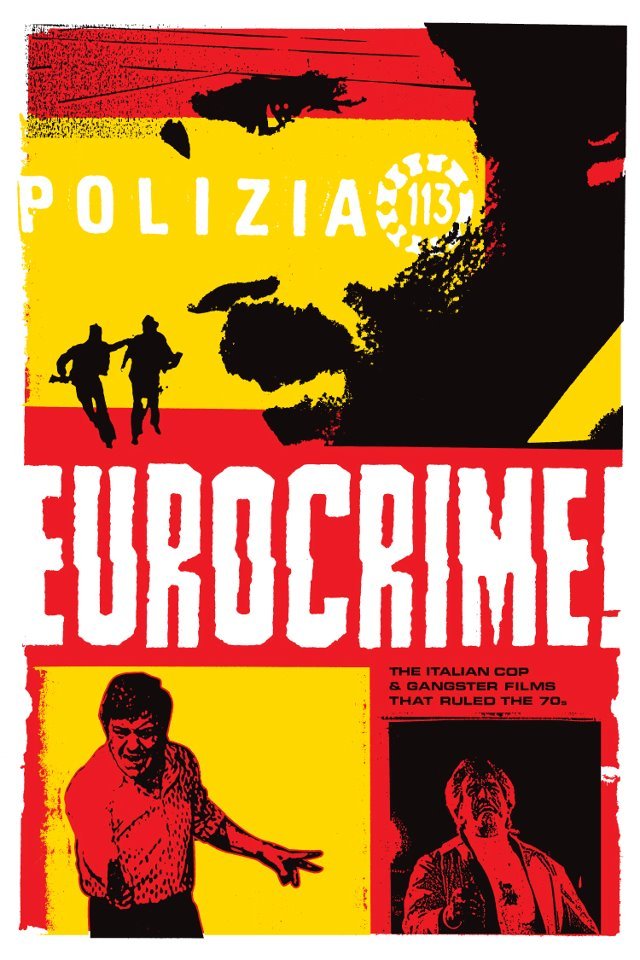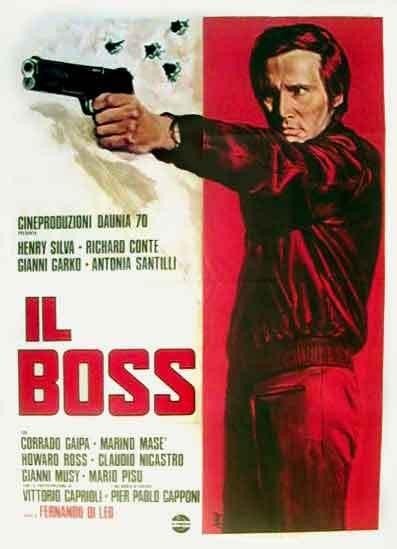EUROCRIME: A Personalized Review For A Deserving Documentary
Full Disclosure: I've known Mike Malloy, the director of this documentary, for a few years now. I watched this doc in an early form, my name appears in the "special thanks" credits at the end and Mike also recently played a starring role in a short film I wrote and co-produced. I'm disclosing this upfront for those who prefer their reviews as objective as possible. I can only be subjective because I'm a fan of the film and its auteur. However, this allows me a personal view that you won't see in many Eurocrime write-ups. I'll also be breaking the usual Schlockmania rule of "no first person writing" to maintain the personal tone in the piece that follows.I was both surprised and delighted when I found out that Mike Malloy was making a documentary on Italian crime films. Even in today's net-savvy, "everything is available" cult film culture, this flavor of cult film is still a minority interest. As a result, it's been hard to find a lot of information on the topic. Before viewing it, I was simply hoping to get some insight into the why and how behind this subgenre and perhaps a few fun interviews and film clips. What Malloy and his crew have delivered with Eurocrime far surpassed my expectations. Not only is this documentary an excellent primer on the subject of Italian crime films, it is also an ambitious and multi-layered piece of work that challenges the viewer to perceive its topic on multiple levels.Eurocrime achieves this distinction by placing the Italian crime film subgenre in a multifaced context for the audience: the birth, life, decline and rebirth of these films are told against the backdrop of Italy's film culture. You'll learn about how the popularity of films like Bullitt, The French Connection and Dirty Harry inspired Italian filmmakers - and once a few trailblazers proved homegrown variations of this style could work, Italian cinema's natural tendency for fads and imitations of popular successes led to a glut of action-packed films that were popular from the early '70s into the mid-80s.However, Eurocrime doesn't just stick to the films themselves. It opens up the topic of the Italian crime film to address how it reflects both the political and personal elements of the culture that spawned it. There is some interesting discussion of the Red Brigade, who created a climate of fear in Italy during the '70s via a string of kidnappings and violent crimes. Learning about this element of Italian culture adds an interesting shading to the cathartic violence and "instant justice" sensibility of these films.Eur
Before viewing it, I was simply hoping to get some insight into the why and how behind this subgenre and perhaps a few fun interviews and film clips. What Malloy and his crew have delivered with Eurocrime far surpassed my expectations. Not only is this documentary an excellent primer on the subject of Italian crime films, it is also an ambitious and multi-layered piece of work that challenges the viewer to perceive its topic on multiple levels.Eurocrime achieves this distinction by placing the Italian crime film subgenre in a multifaced context for the audience: the birth, life, decline and rebirth of these films are told against the backdrop of Italy's film culture. You'll learn about how the popularity of films like Bullitt, The French Connection and Dirty Harry inspired Italian filmmakers - and once a few trailblazers proved homegrown variations of this style could work, Italian cinema's natural tendency for fads and imitations of popular successes led to a glut of action-packed films that were popular from the early '70s into the mid-80s.However, Eurocrime doesn't just stick to the films themselves. It opens up the topic of the Italian crime film to address how it reflects both the political and personal elements of the culture that spawned it. There is some interesting discussion of the Red Brigade, who created a climate of fear in Italy during the '70s via a string of kidnappings and violent crimes. Learning about this element of Italian culture adds an interesting shading to the cathartic violence and "instant justice" sensibility of these films.Eur ocrime also tackles the casual sexism often expressed in these films with their frequent scenes of women being beaten or raped: to Malloy's credit, he allows Nicoletta Machiavelli, an actress from the era, offer her frank thoughts on the element of the genre. It takes a brave cult movie documentary to risk ruffling fans' feathers by tackling the dark side of their genre - and this part of the film proves that Eurocrime is part of that select group.That said, don't allow the aforementioned elements lead you to believe that Eurocrime is a scholarly treatise. In fact, it crackles with passion and energy for two key reasons. The first is its impressive roster of interview subjects. Fan favorites like Franco Nero, John Saxon, Henry Silva and Fred Williamson are all prominently represented and they all have plenty to say about the experience of shooting these films. They offer interesting testimony about the speed of how these films were shot, the rarity of using sync sound on these shoots (leading to loud sets) and the Italian crews' shockingly casual attitudes towards dangerous stunts.And that's not all for interview subjects. Dubbing artists Ted Rusoff and Michael Forest pop up in a section of film that teaches the viewer about the challenges of creating vocal performances for these films. Antonio Sabato makes a big impression with the rather grandiose sense of ego he imparts to his
ocrime also tackles the casual sexism often expressed in these films with their frequent scenes of women being beaten or raped: to Malloy's credit, he allows Nicoletta Machiavelli, an actress from the era, offer her frank thoughts on the element of the genre. It takes a brave cult movie documentary to risk ruffling fans' feathers by tackling the dark side of their genre - and this part of the film proves that Eurocrime is part of that select group.That said, don't allow the aforementioned elements lead you to believe that Eurocrime is a scholarly treatise. In fact, it crackles with passion and energy for two key reasons. The first is its impressive roster of interview subjects. Fan favorites like Franco Nero, John Saxon, Henry Silva and Fred Williamson are all prominently represented and they all have plenty to say about the experience of shooting these films. They offer interesting testimony about the speed of how these films were shot, the rarity of using sync sound on these shoots (leading to loud sets) and the Italian crews' shockingly casual attitudes towards dangerous stunts.And that's not all for interview subjects. Dubbing artists Ted Rusoff and Michael Forest pop up in a section of film that teaches the viewer about the challenges of creating vocal performances for these films. Antonio Sabato makes a big impression with the rather grandiose sense of ego he imparts to his  statements while Richard Harrison charms with his humility, even when discussing dealing with real mafiosi to get the films made (Chris Mitchum also shows a similarly likeable sense of self-deprecation). Elsewhere, Enzo Castellari, Claudio Fragasso and Mario Caiano represent the filmmaker side of things: the latter has the most interesting things to say about the challenges a director faced in this subgenre.The other element of Eurocrime that energizes the proceedings is the kinetic style that Malloy assembles the film with. When Mike showed me an early cut of the film, he expressed his ambition to make a documentary that used the tools of cinema to make its subject exciting rather than just settling for a procession of talking heads. True to his word, he invests Eurocrime's visuals with an array of stylistic touches you don't always see in these documentaries: split-screens, multi-panel imagery, animation and bursts of flying text to underscore particular points the interview subjects make. Combine these with a machine-gun editing pace and you have a film whose 137 minute running time flies by.In short, Eurocrime is a refreshing antidote to the empty-calorie approach that too many genre-interest documentaries take. Eurocrime not only takes a complex view of its subject, it delivers its material in a way that has style and energy to burn. It's the rare cult flick documentary that dares to educate and challenge you while it delivers the goods - and as a friend of Malloy's, I hope it's just the first time you see his name prominently listed in the credits of a film with well-deserved cult fanbase buzz.
statements while Richard Harrison charms with his humility, even when discussing dealing with real mafiosi to get the films made (Chris Mitchum also shows a similarly likeable sense of self-deprecation). Elsewhere, Enzo Castellari, Claudio Fragasso and Mario Caiano represent the filmmaker side of things: the latter has the most interesting things to say about the challenges a director faced in this subgenre.The other element of Eurocrime that energizes the proceedings is the kinetic style that Malloy assembles the film with. When Mike showed me an early cut of the film, he expressed his ambition to make a documentary that used the tools of cinema to make its subject exciting rather than just settling for a procession of talking heads. True to his word, he invests Eurocrime's visuals with an array of stylistic touches you don't always see in these documentaries: split-screens, multi-panel imagery, animation and bursts of flying text to underscore particular points the interview subjects make. Combine these with a machine-gun editing pace and you have a film whose 137 minute running time flies by.In short, Eurocrime is a refreshing antidote to the empty-calorie approach that too many genre-interest documentaries take. Eurocrime not only takes a complex view of its subject, it delivers its material in a way that has style and energy to burn. It's the rare cult flick documentary that dares to educate and challenge you while it delivers the goods - and as a friend of Malloy's, I hope it's just the first time you see his name prominently listed in the credits of a film with well-deserved cult fanbase buzz.


